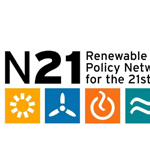Programm > Energy Transition
Energising Cities and Regions – Equitable Energy Transition
Energy Cities, REN 21, Sustainable Energy Africa
Zeit
22 May
14:00 - 17:30
Ort
Kongresshaus Stadthalle Heidelberg
E - Ballsaal
Organisator
Transformations in the energy sector are a crucial element to curb greenhouse gas emissions. While many of the solutions are of a technical nature, the transformation affects many policy areas. The sessions will present scientific and hands-on experience on energy transition processes, and tools in designing a participatory process.
In 2019, it is clear that both the developed and developing world need to move urgently towards a decarbonized economy fuelled by 100% renewables and zero carbon emissions. The landmark 2018 United Nations Intergovernmental Panel on Climate Change (IPCC) Special Report on Global Warming of 1.50C is unambiguous in its clarion call to keep emissions below 1.50C, as time is fast running out in which to effect this. The impact of climate change is already upon us. Society and governments need to act now and this involves an active citizenship.
As this transformation occurs with technology changes bringing about power sector disruption and prices becoming more competitive, it is important to steer change towards ensuring greater levels of access to affordable, clean energy for all, whilst also enabling access by the poor to the opportunities in the emerging sustainable energy economy. In other words a just transition implies that the working class, and in particular the poor, do not have to shoulder the bulk of the burden of shifting to a low carbon, cleaner and more climate resilient society and economy.
Urbanisation is a global phenomenon and is growing. Most energy is consumed in cities which therefore play a pivotal role in a low carbon transition. Cities are the sphere of government closest to the communities they serve and as such hold enormous power to transform the energy and carbon emission profile of countries.
Over the past years, local governments have increasingly used their legislative and purchasing powers to implement change in their own operations and in the wider community. Many cities both large and small have been innovative in the implementation of projects. Champions and city officials have demonstrated an ability to think outside of the box. Despite this much still needs to be achieved.
Long term plans and strategies are an essential ingredient to local level energy transitions and whilst they should pursue the Paris-compatible trajectory, they need to be iterative, responsive and dynamic given the differential circumstances and capabilities of cities worldwide. A participatory design and co-creation process in the development of local strategies, leads to a range of local actors being empowered and having shared responsibility. Moreover, key to the success of plans is the development of achievable levers for implementation that address issues of energy poverty. The workshops will consider support mechanisms and planning to further advance the energy transition in cities (Workshop 1) and then move on to present examples of innovative local action, share and exchange experiences and knowledge (Workshop 2).
REN21 – Rana Adib
Energy Cities – Ian Turner
SEA: Peta Wolpe
Lea Ranalder
Alix Bolle
Sabine Lachenicht
Wesley Wotjas
Stephane Dion, Ambassador of Canada
Jessica Grove-Smith (Passivhaus-Institut)
Michèle Jacobs
Hans-Wolf Zirkwitz
Vincent Fristot
Katri Kuusinen
Sikhumbuzo Hlongwane, executive Director at Economic Development and Planning, KwaDukuza Municipality
Thomas Mnguni, Community campaigner
Dr.Simon Bawakyillenuo, Senior Research Fellow at ISSER- Institute of Statistical, Social and Economic Research, Ghana
Leila Mahomed-Weidemann, Director of Sustainable Energy Markets in the city of Cape Town.
Leshen Moodliar Electricity: Tariff Engineer, representative of association of municipal electric utilities in South Africa EThekwini Metro Municipality
Secou Sarr,Director of Enda Energie, Senegal, ENDA (Environmental Development Action in the Third World)
Ndeye Rokhaya Sarr Coordonnatrice du PCET,City of Dakar (tbc)
Monyake Moteane Senior Specialist city transformation and spatial planning, City of Johannesburg
Dorah Marema Director Gender and Climate change
Patu Ndango Fen, NGO and Privat Sector Association entrepreneur Cameroon
Evelyne Huytebroeck
Bruno Charles
Bernd Vogl
David Murphy
Gerda Flo
Joel Dozzi
Workshop 1: 14h00 – 15h30 Energizing cities –
Policies and mechanisms to support local renewable energy implementation
Workshop 2: 16h00 – 17h30 Energizing cities –
Challenges and opportunities for local action


 Energy Cities
Energy Cities
 REN21
REN21


